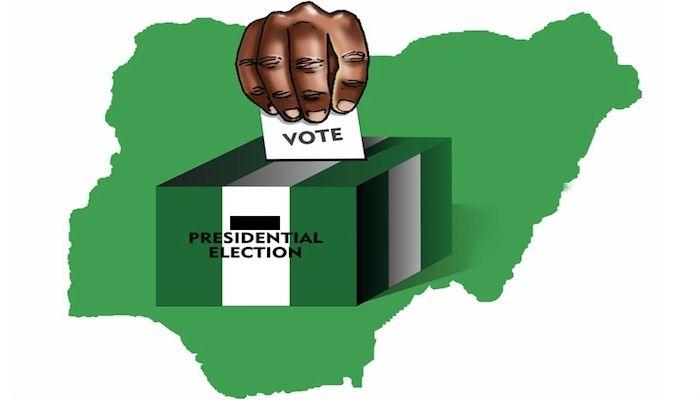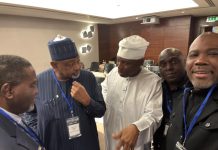Abba Hamisu Sani
Africa-Press – Nigeria. Election is the major attribute of Democracy as citizens have the right to choose their leaders with a specific tenure which differ from one Country to another.
Nigeria returned to civil rule in 1999 after years of Military dictatorship which lasted for 19 years .
Olusegun Obasanjo is the second elected president in Nigeria after Shehu Shehu Shagari who ruled during the second Republic from 1979 to 1984.
Independent National Electoral Commission INEC was the institution established by the 1999 Nigerian Constitution saddled with the responsibilities of conducting elections in Nigeria .
The polls it conducted from 1999 to 2019 include Presidential ,National Assembly , Gubernatorial and State House of Assemblies INEC, started with Justice Ephraim Akpata as chairman under him the election body had an election that was accepted by all political parties and described by both the foreign and local observers as free, fair and credible.
INEC elections under various leadership
Following Akpata’s death in 2000, then President Olusegun Obasanjo appointed Dr. Abel Guobadia, a US trained Solid Physics expert also from Edo State, as INEC’s second chairman.
Guobadia conducted the 2003 elections, which recorded a higher turn-out than those of 1999 but were, however, marred by widespread violence and other irregularities.
Surprisingly, Guobadia retired as INEC chairman in May 2005, becoming the first chairman of an electoral commission since Nigeria’s independence in 1960, to complete his tenure. Such a feat was only recorded again in 2015 by Professor Attahiru Jega.
After Guobadia Professor Maurice Iwu was the Chairman of Independent Electoral Commission his tenure was highly criticized as he conducted the 2007 election which produced President Yar’adua which himself acknowledged the in regularities in the election as he pledged to improve the process.
Following Iwu’s ouster, President Goodluck Jonathan nominated the renowned political scientist from Kebbi State, Professor Attahiru Jega, as the new INEC chairman on 8th June 2010.
Many Nigerians saw Jega’s nomination as a quantum leap, not only to Iwu’s integrity battered INEC, but also in line with the promised electoral reforms of Yar’adua/Jonathan presidency.
Aside from the post-election skirmishes that trailed the 2011 general elections in some northern states, both the 2011 and 2015 elections conducted by the Attahiru Jega-led INEC were acknowledged as free and peaceful by international and local observers.
Nevertheless, Jega was criticized by both the opposition and the ruling party in the run-up to the 2015 general elections.
It was during his tenure that permanent Voters card and card reader machines were introduced .
Upon the expiration of his tenure on 31 June 2015, Jega voluntarily bowed out from INEC despite chances of having his appointment renewed.
Professor Mahmood Yakubu, a guerrilla warfare expert from Bauchi State was appointed as the fifth INEC chairman by President Muhammadu Buhari on 21 October 2015.
He succeeded Amina Zakari, who had acted in that capacity since June 2015.
Yakubu came into the INEC job with an impressive record of intelligence as the first and, to date, only Nigerian from the North to obtain a first-class degree in history; however, the task before him might have proven to be quite a different ball game.
He conducted the 2019 election which brought president Buhari for the second time as the leader of the largest black nation.
Yakubu’s main challenge for keenly contested election between the incumbent Buhari and the former Vice President Atiku Abubakar of People’s Democratic Party was the last-minute postponement of the presidential and National Assembly elections, which has again put Yakubu on the spotlight. In all, the 2019 general elections prove to be a huge, ultimate litmus test for Professor Yakubu is now preparing for the conduct of the 2023 election starting with presidential ,National Assembly in February ,Governorship and State legislatures in March.
Changes and Innovations ahead of 2023 Polls
Festus Ogun is an analyst and legal practitioner based in Lagos. He said with the new electoral act amendment law 2022 the conduct of the 2023 election will be different with previous polls.
He stated that in a write up published by the Cable titled: “Key provisions of Electoral Act, 2022” The lawyer said in February 2022, President Muhammadu Buhari finally signed the much awaited and somewhat controversial Electoral Act amendment Bill into law.
Festus stated that the provisions and innovations of the new electoral law if implemented as planned would impact Nigeria’s electoral system as it will make the process more accurate.
The provisions include the following:
EARLY RELEASE OF ELECTION FUNDS TO INEC
Section 3 (subsection 3) of the Electoral Act 2022 provides that funds for general elections must be released at least one year before the election. Under the repealed Electoral Act, No 26, 2010, the disbursement of funds for the elections shall be made in accordance with rules set out by the commission.
EARLY CONDUCT OF PARTY PRIMARIES AND SUBMISSION OF CANDIDATES’ LIST
By virtue of Section 29(subsection 1) of the Electoral Act, 2022, political parties shall hold a primary and submit the list of candidates no later than 180 days before the date appointed for a general election. Under the repealed law, submission of a list of candidates shall not be more than 60 days before the date appointed for a general election.
CANDIDATES TO SEEK JUDICIAL REVIEW OF FALSE INFORMATION
Section 29(subsection 5) of the Electoral Act 2022 provides that only aspirants who participated in a primary election of political parties can approach the federal high court for review where there are grounds to believe that any information given by his political party’s candidate is false. Under the repealed act, any member of the public can challenge a candidate with a forged certificate. That has now been restricted to only aspirants who participated in primaries wherein the candidate with forged certificate emerged. Members of the public cannot challenge a candidate that submits false information to INEC.
LEGITIMISATION OF E-VOTING/TRANSMISSION OF RESULT
Sections 47 and 50(subsection 2) of the Electoral Act, 2022 gives legal backing for use of smart card readers, electronic accreditation of voters and any other voter accreditation technology that INEC deploys. Not just that, it gives legal backing to the electronic transmission of result as INEC now has the power to determine the manner(s) of transmission of result. Recall that the commission introduced the result viewing portal in August, 2020. Section 62(2) gives the commission the power to maintain a centralized electronic register of elections for e-collation.
POLITICAL APPOINTEE NOT ELIGIBLE AS VOTING DELEGATE OR ASPIRANT
By virtue of Section 84(12) of the Electoral Act, 2022, anyone holding a political office must vacate the position before he or she can be eligible to participate in a primary election, convention or congress of political parties either as a candidate or as a delegate. This provision only covers political appointees and does not extend to elected political office holders or public officers employed to the public service. Also, the period when they should relinquish the position seems to be immaterial. What is important is that they must have vacated the political appointment before the convention or congress of their party.
VOTERS WITH PHYSICAL DISABILITIES, SPECIAL NEEDS
Section 54 of the Electoral Act, 2022 provides that voters with visual impairment and other forms of disability or incapacitation should be assisted at the polling unit by a person chosen by him or her and the commission shall take
reasonable steps to ensure these persons are assisted and provided by suitable means of communication such as braille, large embossed print, electronic devices, sign language interpretation, or offsite voting in appropriate cases.
OVER VOTING REDEFINED
Section 51 Electoral Act, 2022 provides that the total number of accredited voters will become a factor in determining over a voting at election tribunals. Thus, where the number of votes cast at an election in any polling unit exceeds the number of accredited voters in that polling unit, the presiding officer shall cancel the result of the election in that polling unit.
This is an improvement on the repealed electoral law which provided that the number of registered voters, as opposed to accredited voters, shall be the factor in determining over-voting at election tribunals and only the commission can declare the election at the polling unit as null and void.
REVIEW OF ELECTION RESULTS DECLARED UNDER DURESS
By virtue of Section 65 of the Electoral Act, 2022, INEC can now, within 7 days, review results declared by a returning officer under duress or where such a declaration was made contrary to the provision of the law, regulations and guidelines, and manual for the election. This is without prejudice to the jurisdiction of a court of competent jurisdiction or election tribunal to review the decision of the returning officer.
EARLY COMMENCEMENT OF CAMPAIGN
Section 94 Electoral Act, 2022 provides that campaign shall commence 150 days before polling day and end 24 hours prior to that day. Under the repealed law, political parties have just 90 days before polling day.
DEATH OF CANDIDATE BEFORE OR AFTER POLLS
Where a nominated candidate dies before the date of election, Section 34 of the Electoral Act, 2022 empowers INEC to suspend the poll and fix a new date for the election within 14 days of the death of the candidate.
Similarly, where a nominated candidate dies after the commencement of polls and before the final result and declaration of a winner, INEC is empowered to suspend the election for a period not more than 21 days.
Provided that where there is an election into a legislative House, a fresh primary shall be conducted by the political party of the deceased candidate within 14 days of death.
However, in case of presidential or gubernatorial or federal capital territory area council election, the running mate shall continue with the election and nominate a new running mate.
The legal practitioner restated that It is more safe as the new Electoral Act is a timely improvement of the repealed version. Incontrovertible, its implementation has the potential of sanitizing our polluted political atmosphere, reducing election related litigations and instilling transparency and accountability in the electoral processes.
For More News And Analysis About Nigeria Follow Africa-Press







